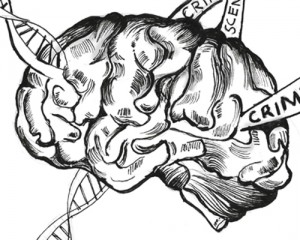Consider DNA to prevent future violence
On June 7, John Zawahri killed five people and injured five more at Santa Monica College.
As investigators and psychologists attempt to dig up details of the perpetrator’s life in a quest to find what drove such a heinous act of aggression, their investigation will most likely reveal a familiar pattern: the suspect had a history of abusing children or being abused as a child and the debate on gun control will pick up where it left off.
It’s a relatively new area of study, but some neuroscientists have suggested another factor that causes killers’ violent ways — that the motive of a killer could actually be embedded in his or her genes.
This might shed some light on the biological triggers behind the killer and answer the question of why people kill to begin with. Society needs to take advantage of today’s cutting-edge science to research the role that genetics play in committing violent acts because being more knowledgeable about this issue could potentially prevent the deaths of innocent people. People often fail to realize that it’s not just about the weapon or the upbringing. Having a gun does not make a person kill, and lacking a gun will not prevent a person from killing; abused children don’t always abuse in return, and children who grew up in a loving family sometimes end up on death row.
James Fallon, a professor of neurobiology at the University of California, Irvine, has spent the last two decades researching the brains of convicted killers to figure out how killers’ brains are anatomically different. He studies subjects from a neurological and genetic vantage point and has come to the conclusion that there is a tangible and measurable difference in the brains of those are considered normal and healthy and those with a genetic predisposition to take lives.
Killers have less-active orbital cortices, which are involved in decision-making and ethical behaviors. In addition to abnormal brain structure, a certain version of the MAO-A gene, otherwise known as the “warrior gene,” is linked to people who show excessive or uncontrolled violence, according to NPR.
Fallon also comes from a family with a history of violence, with about eight relatives who were alleged killers. He himself possesses the “killer” variant of the MAO-A gene that he identified as being linked to aggression.
Fortunately, Fallon’s “killer gene” has not manifested itself in the form of serious aggression. What’s certain is that some people are biologically more inclined to kill, but the link between genetics and actual violent acts remains unclear.
Jeffrey Landrigan, a convicted killer executed in 2010, was adopted and raised by a highly educated, financially stable and loving family. He murdered two people and while on death row, as fate would have it, discovered his biological father was also on death row in a different state, convicted of murder. Landrigan later found out that his grandfather was also a violent criminal, according to Business Insider.
Nearly a dozen studies show that adopted children with biological parents who were criminals are more likely to commit crimes, regardless of how they were raised. Landrigan’s case is one of many that illustrate the powerful role of genetics in defining aggression, an idea discussed by criminologist Adrian Raine in his book The Anatomy of Violence.
In the United States, there are only two major scientists who study this subject, and the research is sparse not only because of its nascent nature but also because people don’t want to believe that they are defined by their DNA.
Killers won’t be able to blame everything on their DNA, and there are certainly people in prison who aren’t biologically inclined to kill. But even if there’s the slightest possibility that killers have an innate impulse that push them to commit their actions, society has a responsibility to do more research.
Killers are still responsible for their own actions, as we all are, but as human beings, they deserve to at least know that they were dealt a bad hand so that they can find the help they need to overcome their genetic inclinations.
Murong He is a junior majoring in accounting.

